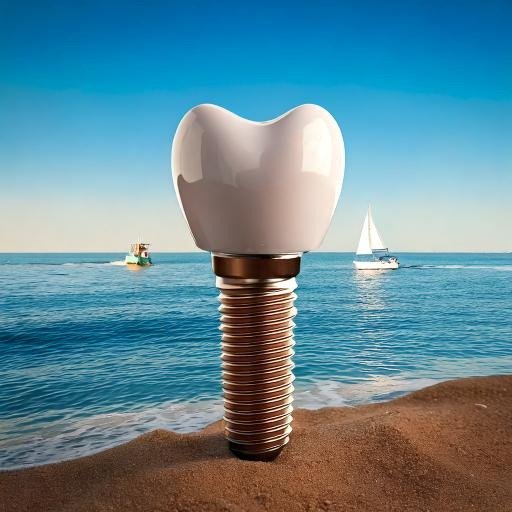Dental implants are rapidly becoming the gold standard for tooth replacement in modern dentistry. Yet, despite their rising popularity, many myths and misconceptions continue to circulate, often preventing individuals from pursuing this life-changing treatment. If you’re considering Dental Implants at Horley & Gatwick Dental Centre but have been deterred by some of the misinformation out there, this article is for you. We’ll debunk the top five myths surrounding dental implants, offering clear, evidence-based information to help you make an informed decision.
What Are Dental Implants?
Before diving into the myths surrounding dental implants, it’s important to have a clear understanding of what dental implants actually are and how they work. Dental implants are essentially artificial tooth roots that serve as a robust foundation for replacement teeth. These roots are typically made of titanium, a biocompatible metal known for its strength, durability, and ability to integrate seamlessly with human bone tissue. This integration, known as osseointegration, is a key factor in the success of dental implants, as it allows the implant to fuse with the jawbone, creating a stable and permanent base for the replacement tooth or teeth.
The process of getting dental implants involves surgically placing the titanium post into the jawbone beneath the gum line. Over time, the implant bonds with the bone, mimicking the function of a natural tooth root. This bond is what gives dental implants their remarkable strength and durability, enabling them to support a single crown, a bridge, or even a full set of dentures. Unlike traditional dentures or bridges, which rest on the gums or rely on adjacent teeth for support, dental implants are anchored directly into the jawbone. This not only provides a more secure and comfortable fit but also helps to preserve the jawbone by preventing the bone loss that typically occurs after tooth loss.
Dental implants have truly revolutionised dental care, offering a long-lasting, functional, and aesthetically pleasing solution for missing teeth. They not only restore the appearance of a natural smile but also enhance the overall function of the mouth, allowing individuals to eat, speak, and smile with confidence. Furthermore, because they are designed to be permanent, with proper care, dental implants can last a lifetime, making them a highly effective and sustainable option for tooth replacement.
Myth 1: Dental Implants Are Painful
Reality: One of the most prevalent concerns regarding dental implants is the pain associated with the procedure. The thought of having a device surgically inserted into your jawbone can be intimidating, but the reality is far less frightening.
Thanks to advancements in modern dentistry, the process of receiving dental implants is designed to be as comfortable as possible. Local anesthesia is administered during the procedure to numb the area, ensuring you won’t experience any pain while the implant is inserted. Although some patients may feel mild discomfort during the healing phase—similar to what one might experience after a routine tooth extraction—this discomfort is usually manageable with over-the-counter pain medications. In fact, many patients find the experience to be much less painful than they had expected.
Additionally, dental professionals prioritize making your experience as pain-free as they can. They will collaborate with you to address any anxieties or concerns you may have, providing sedation options if needed. It’s also important to consider that the advantages of dental implants significantly outweigh the temporary discomfort, offering a permanent solution for tooth loss that can last a lifetime.
Myth 2: Dental Implants Are Too Expensive
Reality: It’s well-known that dental implants can represent a significant financial commitment, but it’s essential to weigh the long-term benefits they provide. Although the initial cost may appear steep, dental implants prove to be a cost-effective option over time.
When compared to alternatives like dentures or bridges, implants excel in terms of durability and lifespan. Conventional dentures and bridges usually require replacement every 5 to 10 years, which can accumulate substantial costs. In contrast, dental implants are intended to last a lifetime with appropriate care, making them a one-time investment in your dental health.
Additionally, implants help maintain jawbone integrity and prevent bone loss, potentially saving you money on future dental procedures. If bone loss occurs, it can lead to a sunken facial appearance and may necessitate costly bone grafting surgeries if not addressed. By opting for dental implants, you’re not merely replacing a tooth; you’re investing in your long-term dental health and overall wellness.
Furthermore, many dental clinics provide flexible financing options to make implants more accessible. From installment plans to credit alternatives, there are often solutions that can accommodate your budget. It’s also beneficial to check if your dental insurance covers any of the costs associated with implants, as an increasing number of insurance providers are acknowledging the long-term advantages of this treatment.
Myth 3: Dental Implants look fake
Reality: Some people worry that dental implants will look unnatural or fake, but this couldn’t be further from the truth. In fact, one of the primary reasons dental implants are so popular is because of how natural they look and feel.
Dental implants are designed specifically to match the colour, shape, and size of your natural teeth, ensuring they blend seamlessly into your smile. Experienced dental professionals utilise advanced imaging techniques to create an exact replica of your natural tooth, making the implant virtually indistinguishable from your other teeth. Whether you need to replace a single tooth or multiple teeth, implants can restore your smile with exceptional accuracy.
In addition to their appearance, dental implants also function like real teeth. Securely anchored in the jawbone, implants offer the same strength and stability as natural teeth. This allows you to eat, speak, and smile confidently, knowing your implants are both functional and aesthetically pleasing.
Moreover, dental implants play a crucial role in maintaining the natural contour of your face. When teeth are lost, the jawbone can weaken over time, resulting in a sunken or aged look. Implants stimulate the jawbone similar to natural tooth roots, helping to preserve your facial structure and prevent the bone loss that can occur with other tooth replacement methods.
Myth 4: Dental Implants Are high maintenance
Reality: Another common misconception is that dental implants require a lot of special care. In reality, taking care of dental implants is as simple as maintaining your natural teeth.
Just like with your natural teeth, good oral hygiene practices are essential to keeping your dental implants in top condition. This includes brushing twice a day, flossing daily, and visiting your dentist regularly for check-ups and cleanings. The materials used in dental implants are highly durable and resistant to decay, so with proper care, they can last a lifetime.
One of the major advantages of dental implants over other tooth replacement options, such as dentures, is that they do not require any special adhesives or soaking solutions. Unlike dentures, which need to be removed and cleaned regularly, dental implants remain securely in place and can be cleaned just like your natural teeth. This makes them a convenient and low-maintenance option for tooth replacement.
It’s also worth noting that dental implants do not require any alterations to adjacent teeth, unlike dental bridges which often need neighbouring teeth to be filed down to support the bridge. This means that implants help preserve your natural teeth and maintain your overall oral health.
Myth 5: Dental Implants aren’t suitable for everyone
Reality: While it’s true that not everyone is an immediate candidate for dental implants, the vast majority of people are eligible for the procedure. Advances in dental technology and techniques have made implants a viable option for more people than ever before.
The main requirement for dental implants is that the patient has adequate jawbone density to support the implant. If you have previously been informed that you are not a candidate due to bone loss, it’s important to understand that there are now advanced techniques, such as bone grafting, that can help restore bone and make implantation feasible. Additionally, mini implants, which are narrower than traditional implants, may be suitable for patients with lower bone density.
Age is not a barrier when it comes to dental implants. Patients of all ages, including both younger and older individuals, can benefit from implants as long as their jawbones are fully developed and they are in good overall health. In fact, dental implants can be especially advantageous for older adults who may have lost teeth due to age-related issues.
Even if you have certain health conditions, you may still be a suitable candidate for dental implants. Your dentist will perform a comprehensive assessment of your oral and overall health to determine whether implants are appropriate for you. Conditions such as diabetes, osteoporosis, or gum disease might require additional treatment prior to implant placement, but they do not automatically disqualify you from receiving implants.
If you’re unsure whether you’re a candidate for dental implants, the best course of action is to schedule a consultation with a dental professional. They will assess your specific situation and discuss the options available to you, ensuring that you receive the best possible care.
The Benefits of Dental Implants: A Summary
Now that we’ve debunked the top five myths about dental implants, let’s summarise the benefits that make them such an attractive option for tooth replacement:
- Long-Lasting Solution: Dental implants are designed to last a lifetime with proper care, making them a cost-effective long-term investment.
- Natural Appearance: Implants are custom-made to match your natural teeth, ensuring a seamless and aesthetically pleasing result.
- Functionality: Dental implants function like natural teeth, allowing you to eat, speak, and smile with confidence.
- Low Maintenance: Implants require no special care beyond good oral hygiene practices, making them a convenient option for tooth replacement.
- Preservation of Oral Health: Dental implants help maintain jawbone density and prevent the bone loss that can occur with other tooth replacement options.
Making an Informed Decision about dental implants
Dental implants are a safe, reliable, and effective solution for replacing missing teeth. However, it’s essential to separate fact from fiction when considering this treatment. By debunking these common myths, we hope to provide you with the information you need to make an informed decision about your oral health.
If you’re considering dental implants, don’t let misconceptions hold you back. Consult with a qualified dental professional who can guide you through the process, answer your questions, and help you achieve the smile you’ve always wanted. With the right care and attention, dental implants can offer a lifetime of benefits, enhancing not only your smile but your overall quality of life.





